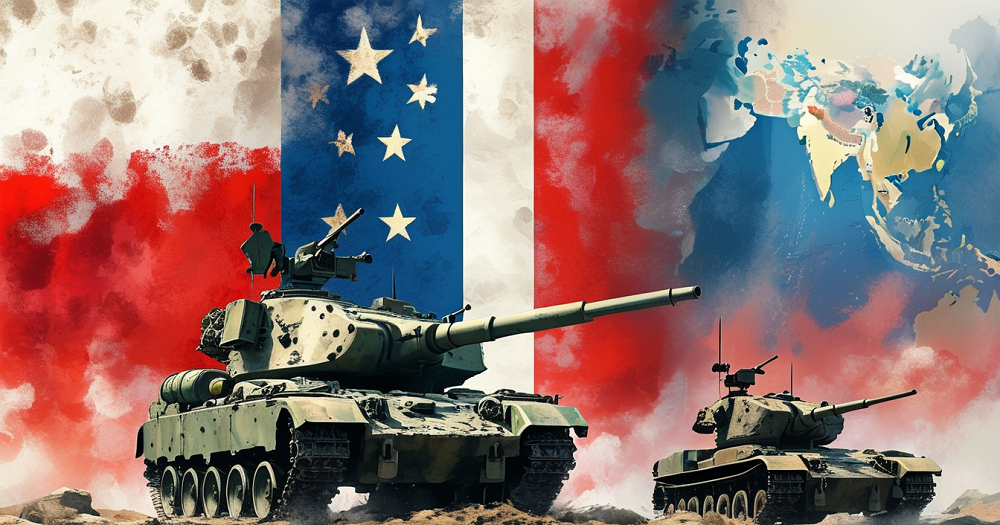
Sino-Russian alliance grows, raising US risks in Asia, Middle East
During his recent address at the United Nations, Frederick Kempe spotlighted two pressing issues that are capturing the attention of global leaders: the increasing collaboration between China and Russia and the wavering confidence in U.S. leadership as the November elections approach. Kempe painted a stark picture, describing this partnership as a “dark cloud” that looms over international diplomacy.
The implications of this alliance are profound, as it not only empowers Russia in its ongoing military actions but also bolsters Iran and its various proxies operating in the Middle East. Kempe believes that the need for a decisive and cohesive response from the U.S. and its allies is more urgent than ever. As the relationship between these two nations deepens, the risks associated with their joint actions become more significant, urging American leadership to adeptly maneuver through the intricate web of global relations. This situation transcends mere regional conflicts; it directly impacts the overall stability of the global order and raises critical questions about whether the U.S. can retain its influence in a rapidly evolving geopolitical environment.
Kempe emphasized that the growing partnership between China and Russia is not just about their shared interests; it’s about how their collaboration can destabilize regions far beyond their borders. By supporting one another, these countries are fostering an environment that can escalate tensions in various hotspots around the world, particularly in Europe and the Middle East. For instance, as Russia continues its military campaign in Ukraine, China’s backing plays a crucial role in providing the Kremlin with the resources and political support it needs.
Meanwhile, Iran, seeing an opportunity in this alliance, is strengthening its ties with both countries, which only complicates matters further. Kempe warned that the consequences of this partnership extend into military capabilities and economic sanctions, impacting not only the countries directly involved but also their global allies. The ramifications could lead to a power struggle that would reshape international relations, making it imperative for the U.S. to take proactive measures to counter these developments. Sino-Russian alliance grows, raising US risks in Asia, Middle East.
The uncertainty surrounding U.S. leadership adds another layer of complexity to this geopolitical puzzle. With the upcoming elections, there is a palpable concern about how a change in administration could affect America’s stance on these pressing issues. Will the U.S. maintain its commitment to its allies, or will it retreat into isolationism? Kempe highlighted that the current global climate demands strong and consistent leadership to navigate these turbulent waters.
He believes that a lack of clear direction from the U.S. could embolden not only China and Russia but also other authoritarian regimes around the world. In this context, it becomes increasingly important for American leaders to articulate a vision that reassures allies and deters adversaries. This is not just about responding to current threats; it’s about shaping the future of global diplomacy and ensuring that the U.S. remains a central player on the world stage. As Kempe notes, the stakes have never been higher, and the actions taken in the coming months could have far-reaching consequences for global stability. Sino-Russian alliance.

Sino-Russian alliance grows, raising US risks in Asia, Middle East
Condoleezza Rice’s recent appearance at the Atlantic Council’s Global Futures Forum brought fresh attention to critical global issues, highlighting her belief that the current international landscape poses greater risks than the Cold War era. This sentiment echoes the concerns voiced by Frederick Kempe, who outlined what he refers to as the “four horsemen of the Apocalypse”: populism, nativism, isolationism, and protectionism.
These trends complicate an already intricate geopolitical environment, making it increasingly difficult for the U.S. to effectively assert its leadership. As the world grapples with these challenges, Rice and Kempe emphasize the necessity for strong, proactive responses from U.S. leaders to address not just immediate threats, but also the underlying forces shaping global affairs. The ramifications of these challenges are broad, affecting not only traditional allies but also fostering an environment where authoritarian regimes may feel emboldened to act without fear of repercussions.
A significant part of this evolving landscape is China’s expanding support for Russia, particularly in the context of military capabilities. This partnership not only bolsters Moscow’s ongoing military efforts but also contributes to a growing military-industrial complex that could fundamentally alter the balance of power. As Rice and Kempe discussed, the relationship between these two nations has far-reaching implications for global security.
The growing cooperation between China and Russia is a cause for concern, particularly as it threatens to reshape alliances and encourage other nations to align with authoritarian regimes. The U.S. must pay close attention to this development, as it could lead to increased aggression from both countries in various global hotspots. Moreover, as China strengthens its military ties with Russia, it could potentially divert attention away from other critical areas of concern, such as the South China Sea and Taiwan, where its ambitions could lead to heightened tensions.
In response to these challenges, U.S. Ambassador Nicholas Burns has highlighted the steps taken to counter China’s influence, specifically through sanctions targeting over 300 Chinese companies implicated in supporting Russia’s military capabilities. Sino-Russian alliance grows, raising US risks in Asia, Middle East. However, Kempe argues that such measures alone may not be sufficient to change Beijing’s behavior. Instead, the U.S. must adopt a more comprehensive strategy that not only involves punitive actions but also aims to build stronger alliances with like-minded nations.
This proactive approach is vital to prevent adversaries from consolidating their military strength unchallenged. The importance of maintaining a vigilant and responsive foreign policy cannot be overstated, as the geopolitical landscape continues to evolve rapidly. As Rice and Kempe both underscore, the U.S. faces a pivotal moment in its foreign relations, one that requires both clarity and resolve to navigate successfully. The stakes are high, and the potential consequences of inaction could lead to a more unstable and unpredictable world.
The partnership between China and Russia is becoming a significant hurdle for U.S. foreign policy, presenting unique challenges that demand an immediate and strategic response. Frederick Kempe’s insights highlight the urgency of the situation, calling for American leaders to step up and engage more actively with global partners. This partnership is not just a bilateral issue; it’s reshaping the international landscape in ways that could have far-reaching consequences.
As China and Russia deepen their cooperation, they pose a unified front that threatens not only regional stability but also the broader global order. Kempe emphasizes that to counteract this growing influence, the U.S. must work diligently to strengthen alliances with other nations. A united front is crucial; it is only through collective action that the international community can effectively confront the rising tide of authoritarianism and the instability it brings. The path ahead is likely to be complex and fraught with challenges, but the need for strong leadership and innovative diplomatic strategies is more critical than ever.
As the geopolitical dynamics shift, U.S. foreign policy needs to adapt to the changing landscape characterized by the China-Russia partnership. Kempe urges that American leaders must not only react to these developments but also proactively shape the narrative by fostering strong coalitions with like-minded nations. This approach would involve not only diplomatic engagement but also economic partnerships that can help isolate adversarial alliances.
The reality is that the collaboration between China and Russia is rooted in shared interests, and if the U.S. does not counterbalance this with a robust strategy, it risks losing influence on the global stage. Moreover, the consequences of inaction could lead to further erosion of democratic norms and an increase in aggressive actions from authoritarian regimes. Building coalitions that prioritize shared values—such as democracy, human rights, and economic cooperation—will be key to addressing these challenges. The need for a coordinated response cannot be overstated; as authoritarian regimes become bolder, the stakes for democratic nations grow higher.
Sino-Russian alliance grows, raising US risks in Asia, Middle East
Navigating this increasingly complex geopolitical landscape will require not only strategic foresight but also a commitment to innovation in diplomatic efforts. The U.S. must recognize that its traditional approach to foreign policy may no longer be sufficient in addressing the challenges posed by the Sino-Russian alliance. New strategies that emphasize flexibility, adaptability, and collaboration will be essential. This could involve leveraging technology, economic incentives, and cultural diplomacy to strengthen ties with allies and build new partnerships.
It’s also crucial for the U.S. to engage with international organizations and multilateral forums to amplify its voice in global affairs. As Kempe suggests, the focus must remain on fostering peace and stability in an increasingly uncertain world. By prioritizing collective action and innovative diplomacy, the U.S. can work towards a future where democratic values prevail, and the influence of authoritarian powers is effectively contained. The task at hand is daunting, but with determination and strategic planning, there’s potential for the international community to navigate these turbulent waters and emerge stronger together. Sino-Russian alliance grows, raising US risks in Asia, Middle East.


